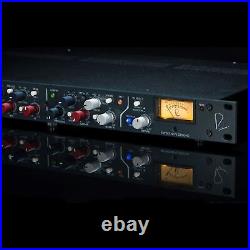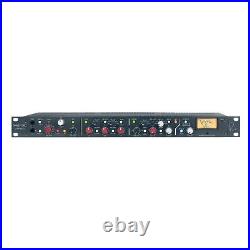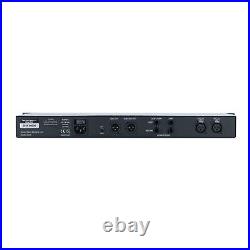Rupert Neve Designs Shelford Channel mic pre/ inductor eq / compressor




Rupert Neve Designs Shelford Channel mic pre/ inductor eq / compressor. The Shelford Channel is built around Rupert Neve's first new transformer-gain, class-A microphone preamplifier in over 40 years, a "best-of-the-classics" inductor EQ section, a tone-packed diode bridge compressor, the power of variable Silk saturation, a new dual-tap transformer output stage, and twice the operating voltage of vintage designs. Over fifty years in the making, the Shelford Channel is the definitive evolution of the original technologies in Rupert's classic console modules like the 1073, 1064 & 2254, thoughtfully advanced and refined for the 21st century studio. The Input Stage and Transformer Gain Mic Pre. Like Rupert's designs from his time in Little Shelford, the Shelford Channel's preamplifier uses a directly-coupled transformer input with gain provided by the custom transformer itself - a first in over 40 years for Rupert Neve. This new custom-designed input transformer, along with its careful integration with the surrounding class-A circuitry, is critical to the Channel's bold and instantly recognizable character. The Silk & Texture circuit on the Shelford Channel allows you to fine-tune the amount (and type) of harmonic content in the output stage. This means your signal can be adjusted from quite transparent to settings that produce nearly 10x the amount of sonic color as Rupert's vintage modules - and in two very unique modes.
No matter what sound you're looking for, Silk can help get you there. The Dual Tap Transformer Output. Complementing the Silk circuit is the custom-designed output transformer, which uses Rupert Neve Designs' unique dual-tap output topology. This offers both full-headroom (+26dBu) and -6dB outputs, allowing the engineer to drive the unit fully into classic transformer saturation without clipping converters and other devices later in the chain.
The Shelford Channel's 3-band, custom-tapped inductor EQ was inspired by our favorite elements of Rupert's vintage EQ designs. The low frequency band is designed to produce a creamy, resonant bass response similar to a vintage 1064 - but unlike the vintage modules, the LF band on the Shelford Channel can be used as either a shelf or a peak filter, adding punch, dimension, and control to your low end. The midrange band is based on that of the 1073, ideal for sweetening vocals and instruments while bringing them forward in a mix, and its proportional "Q" response makes it well-suited for minimizing problematic frequencies. The high frequency band is a hybrid vintage / modern design, blending inductor circuitry with capacitor-based topologies to achieve vintage tones with enhanced control, with the shelf / peak corner switchable between 8K or 16K.
Like the Inductor EQ and Transformer Gain microphone preamp, the Diode Bridge Compressor in the Shelford Channel is based on the same topologies found in Rupert's vintage designs - but refined & adapted for the modern engineer. What is diode bridge compression? Where the VCA compressor found in the Master Buss Processor provides unmatched clarity, the weighty, harmonically rich tonality of diode bridge compression can be essential in pushing key sources like vocals, electric guitars, bass and drums to the forefront of a mix.
By understanding the limitations of vintage units like the legendary 2254, painstaking effort was taken to reproduce the unique tone of these classics while improving the noise floor & accuracy, expanding inflexible time constants, adding full wave sidechain detection for improved dynamic response, and widening the range of threshold and ratio controls. Delivering the powerful sound of these iconic designs with enhanced flexibility for the modern age, the Shelford's diode bridge compressor is a dynamic tool equipped to make a statement on virtually any mix or track. MAXIMUM INPUT +21.5 dBu from 150 Hz to 22 kHz +8 dBu 20 Hz to 22 kHz.
Un-weighted, 22 Hz-22 kHz, source impedance 150 Ohm balanced. FREQUENCY RESPONSE +/-0.25 dB from 17 Hz to 45 kHz.
MAXIMUM INPUT LEVEL +30.5 dBu 20 Hz to 30 kHz. TOTAL HARMONIC DISTORTION AND NOISE.
0.05% Typical (2nd and 3rd harmonic). Un-weighted, 22 Hz - 22 kHz, source impedance 40 Ohm balanced, no load. TOTAL HARMONIC DISTORTION AND NOISE WITH SILK ENGAGED. 0.0131%, mostly 3rd harmonic (typical).
1.66%, mostly 2rd harmonic (typical). 0.0079%, mostly 3rd harmonic (typical). 0.941%, mostly 2rd harmonic (typical). Continuously variable swept frequency from 20 Hz to 250 Hz.EQ NOISE Un-weighted, 22 Hz-22 kHz: -92 dBu. SIGNAL PRESENT Illuminates GREEN when input stage signal level reaches -20 dBu. OVERLOAD INDICATOR Illuminates RED when input stage signal level reaches -23 dBu.
(BW 22 Hz - 22 kHz). 0 dB Makeup Gain: -84.5 dBu +20 dB Makeup Gain: -64.2 dBu. Measurements taken represent full range achievable between 1.5:1 Ratio and 8:1 Ratio setting. 0 dBu I/P 1kHz Burst Tone used for all recorded measurements.Fast (TC1): Attack 180µS - 1.8mS // Release 100mS - 150mS MedFast (TC2): Attack 750µS - 5.25mS // Release 160mS - 250mS Med (TC3): 2.7mS - 18mS // Release 350mS - 525mS MedSlow (TC4): 4.6mS - 38mS // Release 600mS - 1 S Slow (TC5): 11mS - 72.5mS // Release 800mS - 1.25 S Auto (TC6): 5.75mS - 35.5mS // Release T1 400mS - 850mS, T2 TBD "Fast" Mode Multiplier: Modifies aforementioned TC's by 70% of original value. PRODUCT DIMENSIONS 19" (48.3 cm) x 10.5" (26.7 cm) x 1.75 (4.4 cm). This item is in the category "Musical Instruments & Gear\Pro Audio Equipment\Preamps & Channel Strips". The seller is "thesoundparcel" and is located in this country: US.
This item can be shipped to United States.
- Type: Crossover
- UPC: 752423657360
- EAN: 0752423657360
- Brand: Rupert Neve Designs
- Audio Inputs: XLR
- Number of Channels: 1
- Color: Black
- Preamp Type: Microphone Preamp
- Model: 5035
- MPN: 5035
- Band: HF
- Features: Phantom Power, Compressor
